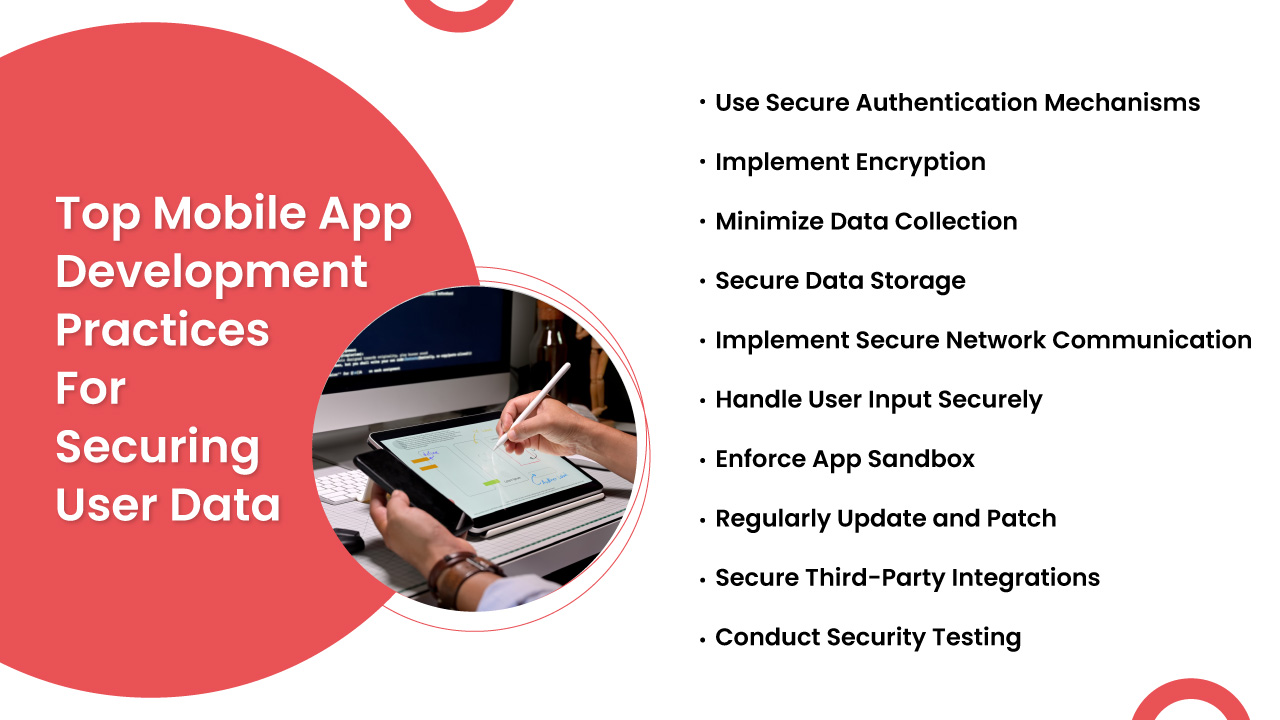Prioritizing User Data and Privacy: Ethical Guidelines for App Development

The digital economy is permeated by data and its uses. On the internet, there are countless data sources and technologies, from online data mining to AI/ML-enhanced analytics. For every digital user accessing programs, there are, however, an equal number of privacy concerns.
Cybercrime has sharply increased in recent years, leaving user information more exposed than ever. In response to these problems, businesses of all sizes and purposes must pledge to use data ethically while enhancing the security of their information systems.
The first step in this approach is to comprehend the numerous privacy concerns that affect consumers when they interact with digital platforms. Users are concerned about fraud and data selling, as well as other uses of their information outside of what is in their own best interests. After understanding the privacy concerns associated with data collecting, investigate the ethical use of data through these useful data applications. You are ethically obligated to do it, and it also makes sound financial sense.
Therefore, organizations must implement the finest security methods to protect the user data in their applications. According to the study, one or two harmful programs are downloaded by employees of organizations in close to 50% of cases. Additionally, 40% or so of mobile apps are still susceptible to hackers. Because of this, users are less trusting of new applications and are more hesitant to utilize them.
What is Mobile Privacy?
Mobile app security refers to the measures and practices implemented to protect mobile applications from various security threats and vulnerabilities. As mobile apps have become an integral part of our daily lives, securing them is crucial to safeguard user data, and privacy, and prevent unauthorized access or malicious activities.
Mobile app security is an ongoing process, and developers should stay updated with the latest security best practices, monitor emerging threats, and promptly address any identified vulnerabilities or security incidents.
Top Mobile App Development Practices For Securing User Data
Remember that securing user data is an ongoing process. It’s important to stay informed about the latest security threats and best practices, keep your app updated, and be responsive to emerging security concerns. When developing mobile apps, there are several practices you can follow to secure user data. Here are some key considerations:

- Use Secure Authentication Mechanisms: Implement strong authentication methods, such as password-based authentication, biometrics (fingerprint, face recognition), or two-factor authentication (2FA). Avoid storing passwords in plain text and use secure hashing algorithms for password storage.
- Implement Encryption: Encrypt sensitive data that is stored on the device, such as user credentials or personal information. Use robust encryption algorithms and ensure that encryption keys are securely managed. Additionally, encrypt data transmitted between the app and the server using secure protocols like HTTPS.
- Minimize Data Collection: Only collect and store the data that is necessary for the app’s functionality. Minimize the amount of personally identifiable information (PII) you collect and retain. Regularly review data storage practices and delete data that is no longer needed.
- Secure Data Storage: Store sensitive data securely on the device by utilizing secure storage APIs provided by the mobile platform. This can include encrypting data at rest, utilizing secure key storage, and implementing proper access controls.
- Implement Secure Network Communication: Ensure that network communications between the mobile app and the server are secure. Use secure protocols like HTTPS and implement certificate pinning to prevent man-in-the-middle attacks. Validate server certificates to ensure the authenticity of the server.
- Handle User Input Securely: Validate and sanitize user input to prevent common vulnerabilities such as SQL injection, cross-site scripting (XSS), and buffer overflows. Implement input validation and output encoding techniques to protect against these types of attacks.
- Enforce App Sandbox: Utilize the security features provided by the mobile operating system to enforce app sandboxing. Sandboxing isolates the app’s data and code execution from other apps, reducing the impact of security breaches.
- Regularly Update and Patch: Stay vigilant about security updates and patches released by the mobile platform and promptly apply them to your app. Keep up with the latest security best practices and ensure your app is using the most secure versions of libraries and frameworks.
- Secure Third-Party Integrations: If your app integrates with third-party services or libraries, ensure that they adhere to strong security practices. Perform due diligence when selecting and integrating third-party components, and regularly update them to address security vulnerabilities.
- Conduct Security Testing: Perform regular security testing and code reviews to identify and address security vulnerabilities. This can include static code analysis, dynamic testing, penetration testing, and vulnerability assessments. Automated tools and manual testing techniques can help uncover security weaknesses.
Using Data Ethically
By adhering to these ethical principles, you can establish trust with your users, promote responsible data handling, and mitigate potential risks associated with data misuse or privacy breaches.
- Transparency: Be transparent with users about the data you collect, how it will be used, and who it may be shared with. Communicate your data practices through privacy policies and terms of service, ensuring that users are informed and can make informed decisions.
- Consent: Obtain explicit and informed consent from users before collecting their data. Consent should be freely given and provide individuals with the option to opt in or opt out of data collection and usage.
- Purpose Limitation: Collect and use data only for specific, legitimate purposes that have been communicated to users. Avoid using data for unrelated purposes without obtaining additional consent.
- Data Minimization: Only gather and keep the information that is required for the intended use. Reduce the amount of personally identifiable information (PII) that is gathered and, whenever possible, use techniques like anonymization or pseudonymization.
- Data Security: Implement robust security measures to protect the data you collect from unauthorized access, disclosure, or alteration. It includes utilizing encryption, secure storage, access controls, and regular security audits.
- User Rights: Respect user rights regarding their data. Provide individuals with the ability to access, correct, delete, or export their data. Respond promptly and transparently to user requests and inquiries related to their data.
- Data Sharing and Third Parties: If you share data with third parties, ensure that they adhere to similar ethical data practices. Only share data with trusted partners who have appropriate safeguards in place and comply with applicable data protection regulations.
- Data Retention: Establish clear data retention periods and only retain data for as long as necessary to fulfill the purpose for which it was collected. Once data is no longer needed, securely delete or anonymize it.
- Compliance with Laws and Regulations: Stay informed about relevant data protection laws and regulations in your jurisdiction and ensure compliance with them. This includes regulations such as the General Data Protection Regulation (GDPR) in the European Union and the California Consumer Privacy Act (CCPA) in the United States.
- Regular Audits and Assessments: Conduct regular audits and assessments of your data practices to ensure compliance and identify any areas of improvement. Stay updated with emerging ethical guidelines and industry best practices.
It only takes following the recommended practices for secure mobile app development to create a secure mobile application. It aids in preventing vulnerabilities that could significantly harm the application. Therefore, all business owners should start with solid code that adheres to professional coding standards and uses clear function calls. Additionally, by putting the aforementioned security practices for mobile app development into practice, you may run a profitable business application while protecting the data of your users.
Black Widow Tech, as a top mobile app developer, prioritizes user data and privacy throughout the app development process. Here’s how they ensure user data and privacy:
- Privacy by Design: Prioritize privacy from the start of development.
- Secure Data Handling: Strong encryption and coding practices for data protection.
- Compliance with Regulations: Ensure adherence to data protection laws.
- Informed Consent and Transparency: Clear policies and consent for data usage.
- Data Minimization and Purpose Limitation: Collect only necessary data for specific purposes.
- Secure Third-Party Integration: Assess and ensure secure data sharing with third parties.
- Ongoing Security Assessments: Regular testing to address vulnerabilities.
- User Rights and Data Management: Enable users to control their data.
- Employee Training: Continuous training on privacy best practices.
- Continuous Improvement: Stay updated and support app security enhancement.
You can more effectively address any privacy risk associated with data gathering by seeing each instance of data application through the prism of these ethical principles. Because of this, modern businesses require the consumer confidence that comes with a secure data management system. Make your use of data more ethical by using these guidelines and resources. Reach out to Black Widow Tech– a reputable mobile app development business for expert assistance. The experts will assist you in developing a mobile application that is secure enough to adhere to the rules and legislation governing data protection.
